IRES Track I: Mapping and Quantifying the Natural Disaster Resilience of Displaced People with the University of Rwanda Center for Geographic Information Systems and Remote Sensing
Information for Potential Applicants
Non-RIT students are welcome to apply.
Before applying to the IRES Rwanda project, please review this 10:20 video that contains information for potential IRES Rwanda applicants:
Video Link: https://www.youtube.com/watch?v=FSZWwxIw1GU
If selected for this opportunity, travel costs and a full living stipend are provided to spend 10 weeks in the summer in Rwanda.
This opportunity is available to undergraduate and graduate students at US-based institutions with the following requirements:
1. US-citizen or permanent resident
2. prior GIS classwork (Esri prefered)
3. Grade point average (GPA) of 3.0 or higher
4. Currently enrolled as a full-time student
5. Available to attend Spring 2023 for research meetings (virtual or in person)
6. Must commit to being in Rwanda for 10 weeks during Summer 2023
7. Must be a student in the Summer 2023
8. Agree to participate in a follow-up research activity for 2023-2024 academic year
Strong preference will be given to applicants who will use the research experience for follow-up research work the academic year after the summer research experience.
To apply for the NSF IRES Rwanda Program:
Two general items are needed to apply:
(1) Application materials from you and (2) reference statements from people familiar with you. Both of these items will be collected via a Google Forms.
You will be required to sign in to Google to upload materials.
To submit your application materials, visit this Google Form:
https://forms.gle/bpvJYc9sCgicapMr6
To plan for your submission, you will be asked the following on the Google Form:
a. Basic logistical information (name, school, other facts about you).
b. Self-assessments of technical Skills
c. Upload a 1000-word statement of interest as to why you wish to conduct research in Rwanda and how you see the experience benefiting your educational experience and long-term career prospects in science, technology or engineering fields.
d. Upload a copy of your resume (2-page maximum) outlining your GIS and other relevant skill set and experiences.
e. Contact information (name, phone number, email) for your primary faculty advisor and one other faculty member who can serve as a reference for you.
To submit reference statements from people familiar with you, please have people providing your reference statements submit their responses to via this Google form:
https://forms.gle/a9Wh8fgVbYtGQHy57
To help submitting reference statements from people familiar with you, these people will be asked
1. speak on your maturity and capability for foreign travel;
2. your intellectual capacity for conducting research;
3. any additional comments about you.
Note: Reference statements will only be collected via the Google form listed above. Letters send by email will be disregarded.
Other Important Information:
Recording of Zoom-based information session for interested applicants that was held on Monday October 24, 2022 .
Recoding Link: https://drive.google.com/file/d/16E9gCLz9W5hYxXoWhpTl_SwtP1whzcbw/view?u...
About the Project
This International Research Experience for Students (IRES) is focused on mapping and quantifying the natural disaster resilience of displaced people in Rwanda. Over a three year period, fourteen U.S. graduate students from the Rochester Institute of Technology (RIT) and three undergraduate students from the Monroe Community College Geospatial Information Science and Technology program (MCC) will participate in a ten-week summer research experience at the University of Rwanda Center for Geographic Information Systems and Remote Sensing (CGIS). Significant activities include student access to and learning from CGIS on displaced population natural disaster resilience issues unique to Rwanda, East African context student research training activities, and access to disaster management organizations focused on displaced people such as the Rwandan Ministry of Disaster Management and Refugee Affairs (MIDIMAR) only available in Rwanda. The project will create unique linkages to East African organizations that will train, educate and professionally develop 17 STEM student research scientists over three years focused on disaster resilience, displacement and GIS. The project will broaden participation of underrepresented groups as we will fully leverage RIT's existing underrepresented recruitments networks such as RIT's large Deaf-and-Hard of Hearing population, women, and minorities. The MCC student will create a unique opportunity for undergraduate international research experience as well as community college international research capacity development. Displaced people in Rwanda will also benefit through their participation as field research assistants as well as the research providing outreach and advocacy for their situations. Intellectual products created by IRES students, such as community-scale resilience maps displacement resilience indexes will provide important benefits to society that can bring global attention to displacement and disaster resilience research and GIS. The project is particularly strong in enhancing infrastructure for research and education as IRES students will become part of Rwandan and East African research networks only available by being on-site in Rwanda. CGIS and MIDIMAR for the first time become linked to NSF research. Workshops on disasters and resilience GIS mapping will be conducted by IRES students with Rwandan secondary schools and disaster stakeholder groups for broader project outreach. If successful, findings will be generalizable for additional internationally-focused research beyond displaced population natural disaster resilience in Rwanda (for example, the Syrian and Rohingya refugee crises) and particularly US-national interest disaster resilience and displacement issues like seen in hurricanes Harvey and Maria, creating the potential for broader US-national and international research on displaced population natural disaster resilience that can provide future students with the knowledge, motivation and inspiration to pursue internationally-focused science careers to solve US-national and global challenges.

NSF IRES Rwanda 2022 Cohort - click on each Fellow's picture to learn more about them.
Rob Mitchell
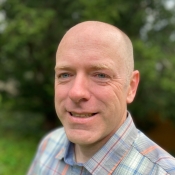
Rob is a Data Science masters candidate at the Rochester Institute of Technology. He received a bachelor's degree in Russian Literature from Amherst College and worked as a reporter, editor, digital manager and other roles in journalism for 15 years before changing careers. He currently works for a human services agency as a data and quality specialist. His research interests stem from his experience reporting on disasters and complex regulatory issues, and include disaster resilience, the intersection of GIS with politics and land use, and the creation of geographic communities. Outside of work and school he enjoys outdoor sports, travel, Everton football and spending time with his wife and three children.
Timothy Scott
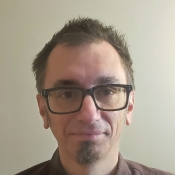
Tim is currently a Geography student on the Geospatial Tech Associates degree track in the Geography department at Monroe Community College (RIT). He has a BS in Cinema production from San Francisco State and a Master's in International Relations from California State University, Fresno. His research is focused on the additional pressures faced by physically disabled migrants and refugees, their treatment, their support, and how they adapt. He intends to use his education and research to aid in building resilience in humanitarian programs for those most in need. In his free time, he enjoys photography, reading, hiking, and travel.
Shelly St. John
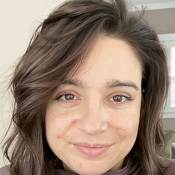
Shelly is currently a student in the Geospatial Information Science and Technology program. She has a BS in Environmental Science from the State University of New York at Albany. Her research interests focus on quantifying the environmental impact of refugee camps and measuring impacts on the host communities using remote sensing analysis.
Nicole Griffin

Nicole Griffin initially graduated from RIT in 2019 with a B.S. in Game Design and Development and a minor in Russian Language and International Relations. They returned to RIT in 2020 to pursue a M.S. in Human-Computer Interaction. During their time there, they realized their passion for research and the pursuit of knowledge. They want to use their passion to bridge interdisciplinary fields of study and hope to gain experience in doing so during this opportunity. They enjoy learning about other cultures and languages, photography, and videography.
Senia Quevedo
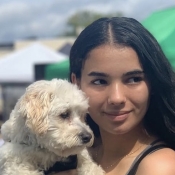
Senia is currently a student in the Biodiversity, Conservation, and Policy program at the University at Albany. She graduated with a B.S. in biology from the University at Albany in 2020. Her research interests are environmental conservation, climate change, and environmental justice. In her free time, she enjoys reading, hiking, kayaking, and spending time with her dog.
NSF IRES Rwanda 2023 Cohort - click on each Fellow's picture to learn more about them.
Emma Stine
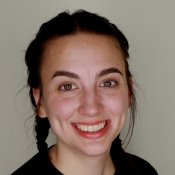
Emma Stine is pursuing a Ph.D. in Civil Engineering from the University of Colorado, Boulder, where she is researching student experiences throughout a graduate program in development engineering, focusing on how these experiences influence career goals and pathways. In addition, she is interested in how these goals align with social justice movements, including if and how students and practitioners address global inequality, especially now, when activists call for the development sector to implement decolonized and anti-racist structures. Emma enjoys craft nights, spending time in parks, floating the river, and other outdoor activities.
Shelley McMullen
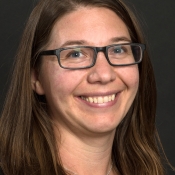
Shelley is an urban planning PhD student in the Geography, Planning and Design program at the University of Colorado Denver. She has a BS in civil engineering from Colorado School of Mines and worked a licensed engineer designing drainage, erosion control and
flood mitigation infrastructure. She went back to school for a dual master's degree in urban and regional planning and public administration at the University of Colorado Denver. She studies the tension between land use policies and disaster risk reduction with a particular interest in the implications of international development and climate adaptation initiatives in the Global South.
Rebekah Walker
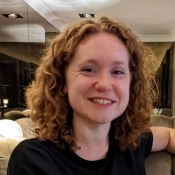
Rebekah is a Science, Technology, and Public Policy MS student at RIT, as well as the Digital Humanities and Social Sciences Librarian at RIT Libraries. She holds an MLIS (Masters of Library and Information Science) from the University of Iowa with a Graduate Certificate in Public Digital Humanities and a BA in English literature and history from Augustana University in Sioux Falls, South Dakota. Her research interests include public access technologies and the application of technology to inform and shape social policy like those that affect refugee settlement. In her free time she enjoys hiking and running, reading, trying new recipes, and spending time with her fiancé and their Labrador.
Vicenzo Roling Stella

Vicenzo Roling Stella is a student researcher at the Massachusetts Maritime Academy.
Sasha Persaud

Sasha is currently a Software Engineering B.S. student at Rochester Institute of Technology with a minor in Geographic Information Systems. Her research interests are software solutions for environmental issues with a focus in embedded systems and remote sensing applications. In her free time, she enjoys reading, cooking, and trail hiking.
Reece Vydrzal
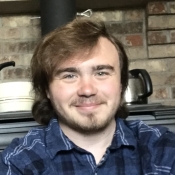
Reece is an undergraduate student at the University of Wisconsin Eau Claire, pursuing a degree in Political Science, and a minor in geography. He is currently interning for a political consulting company in Washington
D.C. as well as for a consultant in Eau Claire while he attends university there. His research interests center on political geography and comparative politics. In his free time Reece enjoys hunting, hiking, and has recently
tried his hand at picking up chess.